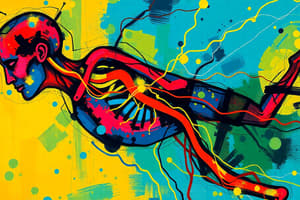Podcast
Questions and Answers
Which type of disease affects the axon and/or myelin sheaths of motor neurons?
Which type of disease affects the axon and/or myelin sheaths of motor neurons?
- Peripheral neuropathies (correct)
- Sensory neuron neuropathies
- Myogenic diseases
- Motor neuron diseases
What is the most common cause of Myasthenia Gravis?
What is the most common cause of Myasthenia Gravis?
- Congenital transfer of antibodies
- Inherited mutations
- Autoimmune response (correct)
- Bacterial infection
What is the role of proprioceptive signals affected by sensory neuron neuropathies?
What is the role of proprioceptive signals affected by sensory neuron neuropathies?
- Transmitting pain signals
- Initiating muscle contractions
- Coordinating voluntary limb movements (correct)
- Regulating heart rate
Which disease is known to result in a failure in transmission of signals at the neuromuscular junction?
Which disease is known to result in a failure in transmission of signals at the neuromuscular junction?
Which diseases can affect proprioception and lead to difficulties with voluntary limb movements?
Which diseases can affect proprioception and lead to difficulties with voluntary limb movements?
Which system is primarily attacked in an autoimmune disorder that causes muscle weakness due to damage to the myelin sheaths?
Which system is primarily attacked in an autoimmune disorder that causes muscle weakness due to damage to the myelin sheaths?
What symptom is common to both neurogenic and myopathic diseases?
What symptom is common to both neurogenic and myopathic diseases?
Which characteristic is typical of upper motor neuron disease?
Which characteristic is typical of upper motor neuron disease?
What clinical feature can differentiate neurogenic muscle weakness from myopathic muscle weakness?
What clinical feature can differentiate neurogenic muscle weakness from myopathic muscle weakness?
Which of these is a characteristic clinical sign of lower motor neuron disease?
Which of these is a characteristic clinical sign of lower motor neuron disease?
Study Notes
Classification of Muscle Disorders
- Myogenic diseases/myopathies: affect skeletal muscle fibers directly (e.g. muscular dystrophy)
- Neuromuscular transmission diseases: affect the neuromuscular junction/synapse
- Neurogenic diseases/neuropathies: affect ventral horn motor neurons that project to skeletal muscles
Subcategories of Neurogenic Diseases
- Motor neuron diseases: affect the cell body of motor neurons
- Peripheral neuropathies: affect the axon and/or myelin sheaths of motor neurons
Sensory Neuropathies
- Affect transmission of proprioceptive signals from muscles, joints, and skin to somatosensory cortices and cerebellum
- Can lead to difficulties with accurately coordinating voluntary limb movements and uncontrollable involuntary limb movements
- Rare and usually due to an unusual autoimmune response
Myasthenia Gravis
- A neuromuscular junction disease resulting in failure of signal transmission
- Causes include:
- Autoimmune: production of antibodies that attack post-synaptic ACh receptors on skeletal muscle cells
- Congenital: transfer of ACh receptor antibodies across the placenta
- Inherited: gene mutations affecting ACh production and/or signalling
- Results in reduced number of ACh receptors or reduced interaction between ACh and receptors, leading to reduced muscle activation
Guillain-Barré Syndrome (GBS)
- An autoimmune disorder with rapid onset of muscle weakness
- Caused by immune system damaging the peripheral nervous system
- Specifically, attacks the myelin sheaths of lower motor neuron axons
Symptoms of Lower Motor Neuron Diseases
- Muscle weakness
- Muscle atrophy (e.g. wasting)
- Decreased tendon reflexes
- Decreased muscle tone
- Fasciculations (i.e. twitching of the muscle)
Symptoms of Upper Motor Neuron Diseases
- Muscle weakness, but little/no atrophy or paralysis
- Increased tendon reflexes
- Increased muscle tone (spasticity)
- Babinski reflex present
Neurogenic vs. Myopathic Diseases
- Neurogenic diseases: affect motor neuron cell body, axon, and/or neuromuscular junction
- Myopathic diseases: affect the muscle directly
- Both have muscle weakness and atrophy as common symptoms
- Important to determine whether disease is neurogenic or myopathic in patients with muscle weakness
Distribution of Muscle Weakness
- Neurogenic: progressive denervation of skeletal muscles starting distally (e.g. hands and feet)
- Myopathic: muscle weakness and atrophy affecting proximal limbs and trunk initially, leading to myotonia (i.e. inability of muscles to relax) and cramps
Studying That Suits You
Use AI to generate personalized quizzes and flashcards to suit your learning preferences.
Description
This quiz covers the different types of neurological disorders that affect the muscles, including myogenic diseases, neuromuscular transmission diseases, and neurogenic diseases. It also delves into the subcategories of motor neuron diseases and peripheral neuropathies.




